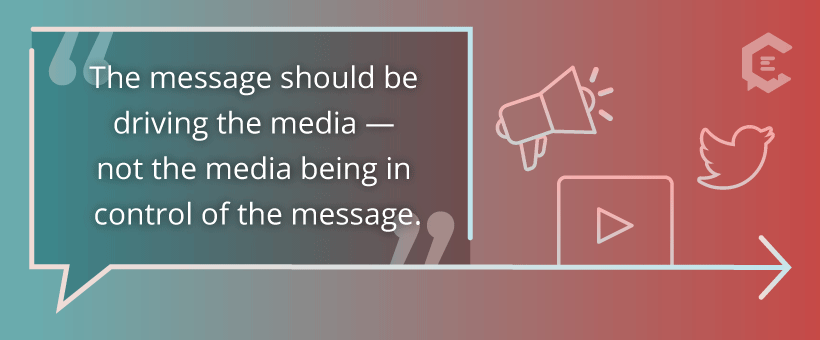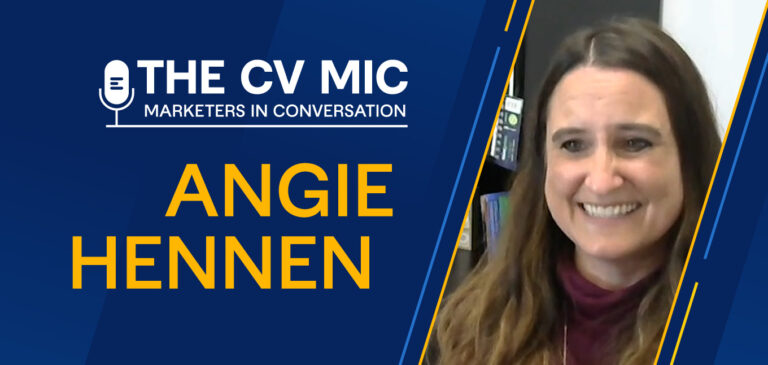How important is storytelling to a content strategy these days? The short answer is: It depends. Assess your audience and its receptivity to the stories you want to tell and the way you want to tell them. Do these stories matter to your audience, and are they something the audience wants to hear from your brand?

“Content is king.” You’ve heard the phrase uttered a million times by all sorts of media titans — from Bill Gates to Sumner Redstone. Turns out what you do with that content, also, pretty important. Enter content queen, Kristina Halvorson, the expert/strategist who’s made a career helping companies make all the right marketing moves — including where to put their web content, what to do with it, and most importantly, how to gauge its success.
You see, Halvorson has made a name for herself cracking content nuts for Fortune 500 companies such as Apple, Allstate, Best Buy, MasterCard and Google. Perhaps you know a few of them. Her mission? To turn messes into the kind of measurable marketing successes mid-level marketing execs and CMOs care about (engagement, retention, et al.). She’s co-written a book on it, founded a conference that dives into it and runs a company called Brain Traffic, a content strategy consultancy that acts as a hired hand for many giants of American business.
The outspoken, Minnesota-based based mom of two was gracious enough to carve 30 minutes out of her uber-busy schedule to answer a few questions about you guessed it: content. Here’s how that went.
First and foremost, why does a company hire Kristina Halvorson and Brain Traffic?
People are coming to us when they have super messy content problems. When people call us, it’s usually for one of three reasons:
1. The first is with regards to a website, where they have been pumping tons of content for many years and they’re interested in sort of redoing it — and they want to do it right, from a content-first perspective.
2. The second reason people call us is that they’re mid-flight with some kind of strategy work. Whether it’s a website redesign or content marketing, longer-term strategy and they’re realizing that they don’t necessarily know if they have all the correct inputs. Or they realize that they made all these big brand and strategy decisions and technological investments — and they find themselves at a crossroads where they’re not sure how to do it.
3. The third thing that we will do is go in and hold one or two-day strategy resets, where we get people in the room and make sure everybody is on the same page about how they’re going to change, or up their game.
Is there a content hierarchy for what you think is most important these days?
I think a lot of times marketers are kind of looking for that silver bullet — we need to do more video; we need to launch six podcasts; we need to make sure that we’re cranking out 10 infographics a day — that’s not how it works and that’s not how audiences think.
You need to be thinking clearly about what industry you’re in; what information you’re looking to convey; what you’re measuring; what your audiences are and are not responding to. We have so much technology in place where people can kind of measure what’s working and what’s not, companies should not be doing the more-is-better, buck-shot approach when it comes to making decisions about where to invest resources and content.
What I’d suggest is rather than worrying about what kind of content or format you’re going to deliver in, think first about your audience and the information you’re wanting to convey and then make a determination about what the best content and media is for that. The message should be driving the media — not the media being in control of the message.
What’s the most consistent red flag you encounter when you get into a Fortune 500 company’s content approach?
Oh, for sure that they just want to know what else they should be doing. How can they make more; how can they keep up with the best that they have created that constantly demands more feeding. That’s the first thing.
The second thing is that oftentimes they’re all about: This content is going to engage and it’s going to create brand perception. But the thing is… They’re not linking brand perception to the actual experience of what people want to do when they’re done with that content marketing — if they’re looking to actually interact with a company or brand for things like e-commerce or help and support or understanding what their sustainability efforts are at the corporate level, things like that. The content marketing efforts become very, very siloed.
What is the best piece of content you’ve seen all month — and what is the worst?
I’m a little bit of a Scrooge when it comes to trying to rein people in with compelling content unless that content is specifically sponsored — or it’s showing up in context on a media site. In that instance, honestly the content I find most compelling is the stuff that makes it easy and delightful to encounter. The brands I follow on Twitter, for example, are the ones that make me smile as I’m scrolling through my feed, but I never click through to them. Denny’s and Slack. They’re using Twitter appropriately, when and where I want them to.
The content that makes me crazy is the stuff that doesn’t get out of my way. So, if I’m on my bank website, and I’m trying to log in to look at my account and instead they’re giving me six different articles I might want to check out about refinancing my house or getting an auto loan… I don’t give a crap about any of that stuff. I just want to check my balance.
Sounds like personality is important to you then? You want to know what the brand stands for… and for them to have a point of view?
I just want it to sound like a person, you know? Again, I’ll come back to my bank. I don’t care what my bank’s brand is, and I don’t care what their point of view is… What I know is that they have an extraordinary dashboard that takes me two seconds to log in, download information, pay external bills. That’s my brand association with my bank. I don’t want to follow them on Twitter. I don’t care.
How do you think something like that Pepsi ad happens?
I think it’s crap. I think an account director somewhere or ad agency executive presented this with a whole lot of swagger to a Pepsi executive and they said it’s going to change [things], it’s in the moment, it’s culture… and they just lost sight of reality because they were so in love with themselves.
How important is storytelling to a content strategy these days?
This is something that’s tough for me anytime I talk about content marketing because it depends… Who is your company? What stories do you want to tell? Why do you want to tell them? What indication do you have that this is something your audience might welcome from you? If you’re trying to tell stories, how are you measuring whether it’s shifting brand perception or driving action from your users? I can’t give you sort of a blanket answer of, ‘Oh, it’s really important in this day and age.’
What do you think has changed the most in the last 10 years in terms of content marketing strategy?
I think people are a lot smarter about how they’re using social media as a platform. I think the brands that are bombarding people on every social media platform just to get clicks has fallen away. I think brands are doing a better job showing up when or where people expect or want them. Or are doing a better job with activity that invites people in… versus gets in their way.
The other thing that brands are starting to get really smart about is whether or not to invest in content marketing. The ones that are doing it right are the ones that are calling us saying how can we up our game, what are we doing wrong? Nine times out of 10 what we end up deciding with them is to do less, but make it as great as it can be — versus doing a lot more. The smart marketers are doing it less, but doing it extraordinarily well.
Engagement in and of itself is not the goal — the goal is the goal.
Explain a little more about that. What’s the best indicator to you that something is working?
Conversion and retention. Retention being key. If your video gets 10 million likes, and your bottom line continues to deteriorate because your service sucks then who cares. Engagement is only one piece of the puzzle. I fully understand and respect that there are 100,000 marketers out there whose primary job is to get eyeballs, to get people to click, to like. But my question is: Is there an opportunity for those marketers to continue that conversation in terms of what’s happening next?
How do you find clients – or do they find you?
They find us. I speak at a ton of conferences; I write books; we get referrals. We’re very, very lucky that all of our business is from incoming leads and long-term clients — because we work hard to maintain visibility through speaking and writing, we don’t need to do much outbound business development.
What is the most common request you get when a new client comes through the door?
Our content is a mess, how can you help us?
I saw a great quote at Digital Summit a couple weeks ago from Jef I. Richards: “Creative without strategy is called ‘art’. Creative with strategy is called ‘advertising’.” More true than ever?
I fully agree with what you’re saying in that you don’t want to fall in love with your creative so that you’re not thinking about that end result… That’s kind of what happened to that Pepsi commercial. Somebody fell in love with it. This is my art. People will embrace it because I am a movie director… I’m all about: Kill your darlings.
If you could sum up your best piece of advice in one sentence for content marketers — what would it be?
Know your audience. And I don’t mean make assumptions about your audience, I mean go out and spend time with them, talk to them, get their feedback. Do polls, do surveys, do smart research, know who they are…
And serve them.





